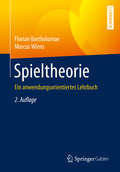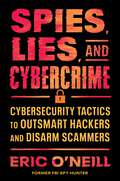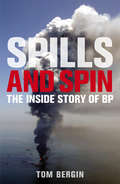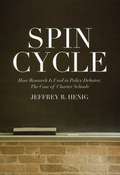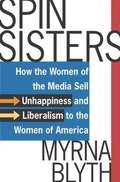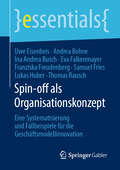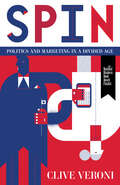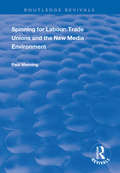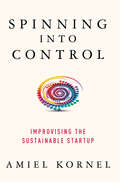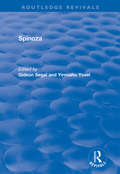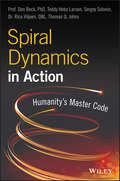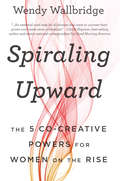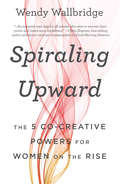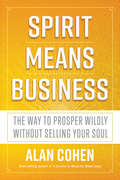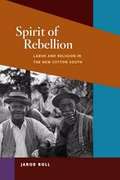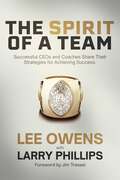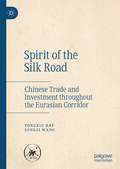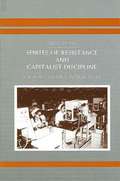- Table View
- List View
Spieltheorie – Erfolgreich verhandeln im Einkauf: Voraussetzungen, Anreize und Vergaben
by Christoph PfeifferDie angewandte Spieltheorie im Einkauf hat sich in vielen Unternehmen zu einem wichtigen Instrument entwickelt, um in Verhandlungen systematisch Erfolge zu erzielen. Der zentrale Baustein spieltheoretisch optimierter Vergaben sind Einkaufsauktionen. Ein Grundwissen über Auktionen und Spieltheorie ist deshalb insbesondere für Einkäufer von Bedeutung. Dieses Buch beschreibt sehr anschaulich viele hilfreiche Methoden sowie deren Anwendung in der Praxis. Für den Einsatz der Spieltheorie im Einkauf eignen sich besonders Vergabesituationen, die über ein hohes Volumen verfügen, die interessant für Lieferanten sind und deren Leistung sich gut spezifizieren lässt. Außerdem wird dargestellt, wie Kartelle oder zurückhaltender Wettbewerb zwischen Lieferanten anhand eines rein datenbasierten Verfahrens identifiziert werden können. Zu jedem Einkauf gehört ein Verkauf. Das Buch richtet sich deshalb nicht nur an Einkäufer. Auch für Verkäufer spielen Auktionen in der Beschaffung und die zugrunde liegenden spieltheoretischen Prinzipien eine gleichermaßen bedeutsame Rolle.
Spieltheorie: Ein anwendungsorientiertes Lehrbuch
by Florian Bartholomae Marcus WiensDieses Lehrbuch vermittelt anhand einfacher Anwendungsaufgaben die spieltheoretischen Grundkonzepte und bietet den Studierenden so die Gelegenheit, die Konzepte durch vertieftes Training zu verinnerlichen. Sowohl die Spieltheorie als auch ihr Anwendungsbereich gewinnt immer mehr an Bedeutung und wird in den unterschiedlichsten Lehrveranstaltungen eingesetzt. Oftmals verhindern jedoch mangelnde Vorkenntnisse oder zu wenig Zeit eine intensivere Auseinandersetzung der Studierenden mit dem Stoff. Dieses Lehrbuch schafft Abhilfe, indem studentenfreundliche Erklärungen, Vertiefungen und nützliche Hinweise gegeben werden. Das Buch gliedert sich in einen theoretischen Grundlagenteil, der die wichtigsten Aspekte kompakt und anschaulich aufbereitet und einen anwendungsorientierten Aufgabenteil, in dem die Leser das Gelernte direkt überprüfen können und viele Anwendungsbeispiele finden.
Spies, Lies, and Cybercrime: Cybersecurity Tactics to Outsmart Hackers and Disarm Scammers
by Eric O'NeillNational security strategist and former FBI counterintelligence operative Eric O’Neill exposes how nefarious cybercriminals relentlessly attempt to access your data and wallet, and arms you with his proven tactics for spotting and neutralizing cyberthreats to protect yourself, your family, and your business.Cybercriminals, domestic and foreign, are launching attacks day and night using malware, phishing scams, deepfakes, artificial intelligence, and other unscrupulous schemes designed to steal your data and hold it hostage. When they win, it costs nations, businesses, and individuals trillions of dollars annually.It’s possible to fight back, but it’ll take more than a strong password. Drawing on his years of experience as an FBI spy hunter and national security strategist, Eric O’Neill casts light on these malicious actors’ tactics for stealing personal data and exploiting victims. Armed with this knowledge, O’Neill shares his method—called PAID—that you can use to defend yourself and stop attackers in their tracks:Prepare: Pinpoint your most critical data, identify where it resides and who can access it, and build your defenses around it.Assess: Continuously reassess your security and apply counterintelligence tactics to identify scams and cyberattacks..Investigate: Stay educated and hunt the threat before the threat hunts you.Decide: Using your new aptitude, make smart, rapid decisions under pressure..Written by a top expert in the field, Spies, Lies, and Cybercrime offers easy-to-follow steps for staving off cyberattacks, securing data, and keeping private information safe in an increasingly digital and dizzying world.
Spillover Effects and the East African Community
by Paulo Drummond Gustavo RamirezThe East African Community (EAC) countries--Kenya, Tanzania, Uganda, and Rwanda--have been affected by the global financial crisis and global recession. the fall in global demand and inflows and tighter liquidity conditions abroad affected the countries in this region as elsewhere in sub-Saharan Africa. But how hard have countries in the EAC been hit? Have the spillovers from the global crisis affected countries in the region as much as other countries in the sub-Saharan region? Have the transmission channels or magnitudes of the spillovers been different across EAC countries? How can these countries return quickly to a path of sustained high growth? What is the role for policy? Would acceleration of regional integration and policy coordination help achieve this goal? Would it make the region less susceptible to shocks? This paper focus on the EAC countries and attempts to address these questions.
Spillover and Feedback Effects in Low Carbon Development
by Youguo ZhangThis book studies the pathways and policies of regional coordinated low carbon development from the perspective of regional spillover-feedback effects. How do regional economies interact with carbon emission? This phenomena, also known as spillover-feedback effects, is explained in depth with reference to datasets and real examples. As China adopts zero-carbon emissions policies within the context of regional disparities, this theoretical construct is gaining utility, and in this book, climate science researchers and political scientists will find it explicated as never before.
Spillovers of Domestic Shocks: Will They Counteract the "Great Moderation"?
by Ashoka Mody Alina CarareA report from the International Monetary Fund.
Spillovers to Central America in Light of the Crisis: What a Difference a Year Makes
by Andrew SwistonA report from the International Monetary Fund.
Spillovers to Emerging Equity Markets: An Econometric Assessment
by Tao Sun L. Effie PsalidaA report from the International Monetary Fund.
Spills and Spin: The Inside Story of BP
by Tom BerginIn April 2010, the world watched in alarm as BP's Macondo well suffered a fatal explosion and a catastrophic leak. Over the next three months, amid tense scenes of corporate and political finger-pointing, millions of barrels of crude oil dispersed across the Gulf of Mexico in what became one of the worst oil spills in history.But there is more to BP's story than this. Tom Bergin, an oil broker turned Reuters reporter, watched the 'two-pipeline company' of the early 1980s grow into a dynamic oil giant and PR machine by the turn of the twenty-first century. His unique access to key figures before, during and after the spill - including former CEO Tony Hayward - has enabled him to piece together this compelling account of a corporation in crisis, and to examine how crucial decisions made during BP's remarkable turnaround paved the way for its darkest hour.
Spin Cycle: How Research Gets Used in Policy Debates--The Case of Charter Schools
by Jeffrey R. HenigOne important aim of social science research is to provide unbiased information that can help guide public policies. However, social science is often construed as politics by other means. Nowhere is the polarized nature of social science research more visible than in the heated debate over charter schools. In Spin Cycle, noted political scientist and education expert Jeffrey Henig explores how controversies over the charter school movement illustrate the use and misuse of research in policy debates. Henig’s compelling narrative reveals that, despite all of the political maneuvering on the public stage, research on school choice has gradually converged on a number of widely accepted findings. This quiet consensus shows how solid research can supersede partisan cleavages and sensationalized media headlines. In Spin Cycle, Henig draws on extensive interviews with researchers, journalists, and funding agencies on both sides of the debate, as well as data on federal and foundation grants and a close analysis of media coverage, to explore how social science research is “spun” in the public sphere. Henig looks at the consequences of a highly controversial New York Times article that cited evidence of poor test performance among charter school students. The front-page story, based on research findings released by the American Federation of Teachers (AFT), sparked an explosive debate over the effectiveness of charter schools. In the ensuing drama, reputable scholars from both ends of the political spectrum launched charges and counter-charges over the research methodology and the implications of the data. Henig uses this political tug-of-war to illustrate broader problems relating to social science: of what relevance is supposedly non-partisan research when findings are wielded as political weapons on both sides of the debate? In the case of charter schools, Henig shows that despite the political posturing in public forums, many researchers have since revised their stances according to accumulating new evidence and have begun to find common ground. Over time, those who favored charter schools were willing to admit that in many instances charter schools are no better than traditional schools. And many who were initially alarmed by the potentially destructive consequences of school choice admitted that their fears were overblown. The core problem, Henig concludes, has less to do with research itself than with the way it is often sensationalized or misrepresented in public discourse. Despite considerable frustration over the politicization of research, until now there has been no systematic analysis of the problem. Spin Cycle provides an engaging narrative and instructive guide with far-reaching implications for the way research is presented to the public. Ultimately, Henig argues, we can do a better job of bringing research to bear on the task of social betterment.
Spin Sisters: How the Women of the Media Sell Unhappiness and Liberalism to the Women of America
by Myrna BlythThe former editor of Lady's Home Journal and other woem's magazines takes a hard, thought-provoking look at how those magazines and the TV news magazines seek to promote a liberal political agenda while selling victimhood and unhappiness to American women. If you've ever wondered how the TV news magazines and women's magazines get those celebrity interviews, you need wonder no more. This book takes you to the dark side of the magazine business, and whether you're a woman who reads those magazines or just a media junky of either gender, you'll find this book fascinating.
Spin-off als Organisationskonzept: Eine Systematisierung und Fallbeispiele für die Geschäftsmodellinnovation (essentials)
by Uwe Eisenbeis Andrea Bohne Ina Andrea Busch Eva Falkenmayer Franziska Freudenberg Samuel Fries Lukas Huber Thomas RauschDie Autoren beschreiben mögliche Typen und Modelle von Spin-offs, einen idealtypischen Spin-off-Prozess mit Phasen und Meilensteinen, eine Zusammenstellung von Herausforderungen und Hindernissen sowie zwei Fallstudien, um den Spin-off-Prozess anhand konkreter Beispiele erlebbar zu machen. Die Handreichung gibt einen ersten Überblick über den Einsatz von Spin-offs als Organisations- sowie Strukturkonzept zur Geschäftsmodellinnovation sowie zur Gestaltung der Spin-off-Gründung. Das essential enthält neben den beiden Fallstudien zusammenfassende Checklisten am Ende der Kapitel.Die Autoren:Prof. Dr. Uwe Eisenbeis ist Wirtschaftswissenschaftler und hat die Professur für Medienmanagement und Ökonomie an Hochschule der Medien in Stuttgart inne. Seine Co-Autorinnen und -Autoren sind Absolventinnen und Absolventen des Studiengangs Medienwirtschaft an der Hochschule der Medien.
Spin: Politics and Marketing in a Divided Age
by Clive VeroniSpin has been updated with a new introduction reflecting on the current era of Brexit and Trump.Aided by masses of data, sophisticated computer modelling, and smart manipulation of social media, political strategists are reshaping the way voters think. And act. Clive Veroni analyzes the inner workings of campaign organizations to show how they build and motivate teams, and how they approach strategic and future planning. And those strategies being used to influence our choices at the ballot box will soon be used to influence our choices in the grocery store.Spin focuses on the well-known characters from the worlds of politics and marketing to reveal how all of us will be affected by the surprising new ways in which companies and politicians will try to persuade us to vote for their brands.
Spinning for Labour: Trade Unions And The New Media Environment (Routledge Revivals)
by Paul ManningFirst published in 1998, this volume asks: are groups or organisations beyond the sphere of Westminster politics doomed to be marginalised in mainstream news coverage, or can the currently fashionable emphasis upon media techniques and 'spin doctoring' offer such non-official news sources a means of securing media success?. This question is now surfacing as a major issue within politics and cultural debates, as well as within the sociology of the mass media and communication studies. We are living through a period of remarkable transformation in politics, culture and social arrangements. Communications experts in the 'new Labour' camp believe that trade unions must respond by becoming more sophisticated in their use of the media and marketing techniques; and by employing new vocabularies for communicating their messages to the public. However, can trade unions succeed in using the tricks of the 1990s spin doctor to restore their position?. This study uses extensive interviews with leading national newspaper journalists and senior figures within trade unions to explore the question. Drawing upon unique archive material the study points to the importance of government in fostering or undermining branches of journalism including coverage of labour relations.
Spinning into Control: Improvising the Sustainable Startup
by Amiel KornelThis book encourages startup founders to maintain control of their destiny by obsessively perfecting their startup's story and key relationships as much as its initial product or service. It highlights the importance of improvisation in the incubation of startups. Startup founders hoping to master their destinies develop the skills of venture craftsmen, learning to behave more like explorers and artisans than managers and engineers. The improvisational arts of tinkering, wandering, and conversing overcome the limitations of scientifically based "lean" methodologies for creating startups. These skills provide wobbly, nascent ventures with stability and conserve momentum during early-stage incubation. Like the gimbals of a gyroscope, they counter the entropy born of change, conflict and confusion that is continuously pushing young enterprises towards chaos. As their startups spin, venture craftsmen actually loosen the coupling between command and control. Startup sustainability relies on relentless improvisation, the heart of the art of entrepreneurship. Vignettes in each chapter of Spinning Into Control relate hardscrabble stories of entrepreneurs, craftsmen and venturers -- some recently interviewed by the author, others historical -- recounting the challenges they faced, their responses, the lessons they learned, and the eventually triumphant outcomes.
Spinoza: Spinoza On Reason And The Free Man (Routledge Revivals)
by Yirmiyahu Yovel Gideon SegalThis title was first published in 2002. This collection of essays aims to present a wide range of interpretations of central themes in Spinoza's philosophy. Philosophical interpretations of Spinoza divide into three general categories. The first sets Spinoza within what is taken to be his historical context. Special emphasis is laid here on aspects of his teaching that seem to bear the influence of Spinoza's own education (and self-education), either through concepts assimilated into his own thinking, or those he undertook to refute and displace. A second interpretative approach uses analytical tools in an attempt to reconstruct Spinozistic issues and theories critically. Finally, there are philosophers who explore Spinoza's texts in their own terms, attempting to present a coherent picture of one or more aspects of Spinoza's teaching. Given the broad span of issues with which Spinoza deals, the latter is often the most difficult track to follow. The 25 articles in this collection exemplify these three attitudes to Spinoza interpretation, though most avail themselves of more than one. In making the selection the editors preferred studies that treat their subject as a viable, endurable philosophical issue, whether the writer accepts Spinoza's presentation or highlights his difficulties. On each issue the articles critically analyze the texts, rather than simply portraying the Spinozistic ideas they express.
Spiral Dynamics in Action: Humanity's Master Code
by Prof. Don Edward Beck Teddy Hebo Larsen Sergey Solonin Dr Rica Viljoen Thomas Q. JohnsA more effective leadership model for the new business environment. Spiral Dynamics in Action explores the evolution of modern business, and provides a model for moving forward amidst ever-increasing complexity and change. Only by truly understanding other people's perspectives can you bring them together to achieve the extraordinary, and this book provides a field guide to the different motivations, behaviours and talents in your team to help you lead diverse groups more effectively. Focused on action over theory, the Spiral Dynamics model includes cutting-edge leadership practices, management systems, processes, procedures and techniques to help you bring about real-world results. The nature of change is consistent, but that doesn't make it any less enormous or complex to deal with. As a business leader, you are tasked with not only navigating change yourself, but also guiding others through the maze successfully. This book shows you how to shift your perspective, hone your focus and deliver what your people need by: Understanding the reasoning behind different perspectives. Helping people play off one another's strengths to achieve a shared goal. Adopting cutting-edge practices, processes and procedures for improvement. Taking action to re-connect an increasingly fragmented environment. The marketplace has gone truly global, workforces are increasingly diverse and companies are taking on powerful new social responsibilities. It's a lot to take in, let alone manage, but the responsibility of leadership is to gather disparate parts and make them into a whole. It's your job to turn anchors into rocket fuel, and motivate and inspire your team to the top. By digging to the core of each person, each culture and each problem, you uncover a roadmap to high performance; Spiral Dynamics in Action shows you how to guide your people through any changes and emerge stronger than before.
Spiraling Upward: The 5 Co-Creative Powers for Women on the Rise
by Wendy WallbridgeWomen comprise 51 percent of the world's population, make up over half of the workforce, and control 85 percent of consumer decisions. It's estimated that two-thirds of the nation's wealth will be in women's hands by 2030. Never before have women been so degreed or so represented as decision-makers in all areas of influence. Why, then, are women withdrawing from leadership positions in unprecedented numbers? Why has the tally of women in middle management reached a plateau?The traditional path to leadership in Western culture was forged by men. This linear, head-down, forward-at-all-costs method doesn't work for women, who define success in more holistic terms, seeking both personal and professional fulfillment. Wendy Wallbridge recognizes this unmet need of professional women for an alternative path to success, and her new book, Spiraling Upward: The 5 Co-Creative Powers for Women on the Rise, offers the solution. Using her tried and true "Spiral Up" method, Wallbridge teaches women to cultivate the five co-creative powers of energy, thoughts, feelings, speech, and action. This method encourages each reader to create a fulfilling life aligned with her own gifts and callings. Complete with easy-to-follow steps and exercises, as well as inspiring stories of thirty successful women, this book offers a cogent, step-by-step roadmap for professional women to unlock their power and achieve success on their own terms.
Spiraling Upward: The 5 Co-Creative Powers for Women on the Rise
by Wendy WallbridgeDual Winner -- 2016 Nautilus Gold Award (Women) and Silver Award (Business & Leadership). Women comprise 51 percent of the world's population, make up over half the workforce, and control 85 percent of consumer decisions. Never before have women been so degreed or so represented as decision makers in all areas of influence. Why, then, do we still feel as if success eludes us? Why do we sometimes struggle to keep our drive alive? The linear, heads-down, forward-at-all-cost approach to success that has been forged by men will never take us to the heart of fulfillment. Women are not designed for the straight and narrow path. But until now there hasn't been another choice. Pioneering corporate coach Wendy Wallbridge recognizes this unmet need of professional women for an alternative path to success. Spiraling Upward: The 5 Co-Creative Powers for Women on the Rise offers a cogent, step-by-step roadmap for professional women to unlock their power and achieve success on their own terms. The "Spiral Up" method teaches women to cultivate the five co-creative powers of energy, thoughts, feelings, speech, and action--the fundamentals of self-creation--in order to redefine success and re-author their lives. If you're ready to rise up and express your creativity, authenticity, voice, and power to effect the changes you want, Spiraling Upward will show you the way. Complete with easy-to-follow steps and exercises, as well as inspiring stories of successful women, this book offers a cogent road map for professional women looking to unlock their power and achieve success on their own terms.
Spire, the CubeSat Revolution, and the Government as a Space Data Customer
by Matthew C. Weinzierl Mehak Sarang Brendan RosseauThis case outlines the rise of Spire Global, a young space company using CubeSats to provide weather data and weather prediction services. In addition to tracing the evolution of a space startup from novel idea to publicly-traded company, the case also examines the broader questions posed by the success of Spire and similar space companies: what are the potential costs and benefits to the privatization of remote sensing satellites? What new possibilities are enabled for both governments and private entities by private remote sensing companies? How does the incipience of companies like Spire challenge the established weather data regime? What's the significance of highly-popular special purpose acquisition companies?
Spirit Means Business: The Way to Prosper Wildly without Selling Your Soul
by Alan CohenBeloved author and teacher Alan Cohen (A Course in Miracles Made Easy) uses his idiosyncratic, insightful spin on spiritual wisdom to show that we can enjoy significant career and financial success and be true to our passion and soul's calling.Can you create material success and keep your spirit alive? Is it possible to combine prosperity with purpose and passion? Can you sell your product without losing your soul?Expert coach and beloved teacher Alan Cohen demonstrates the answer is yes. In Spirit Means Business, he identifies--and then dismantles--the 10 primary illusions that keep us from connecting spirituality and prosperity. To name a few: * If you want to succeed, you have to suffer first * There's only so much to go around * Competition is healthy and necessary * To do well in your work, you must give up your lifeIn each case, Alan shows us how to replace the illusion with a higher truth, using principles that always work when we apply them consciously. You'll learn from down-to-earth examples of individuals who have combined soul and success, and you'll find crisp, clear formulas to bridge the gaps and surmount the hurdles along the way.Drawing on wisdom sources from the Tao Te Ching to A Course in Miracles, as well as stories from Alan's clients and his own life, this book will help you navigate a spiritually sound path to the success you desire.
Spirit of Rebellion: Labor and Religion in the New Cotton South (The Working Class in American History)
by Jarod RollWinner of the Herbert G. Gutman Prize from the Labor and Working-Class History Association In Spirit of Rebellion, Jarod Roll documents an alternative tradition of American protest by linking working-class political movements to grassroots religious revivals. He reveals how ordinary rural citizens in the south used available resources and their shared faith to defend their agrarian livelihoods amid the political and economic upheaval of the first half of the twentieth century. On the frontier of the New Cotton South in Missouri's Bootheel, the relationships between black and white farmers were complicated by racial tensions and bitter competition. Despite these divisions, workers found common ground as dissidents fighting for economic security, decent housing, and basic health, ultimately drawing on the democratic potential of evangelical religion to wage working-class revolts against commodity agriculture and the political forces that buoyed it. Roll convincingly shows how the moral clarity and spiritual vigor these working people found in the burgeoning Pentecostal revivals gave them the courage and fortitude to develop an expansive agenda of workers' rights by tapping into the powers of existing organizations such as the Socialist Party, the Universal Negro Improvement Association, the NAACP, and the interracial Southern Tenant Farmers' Union.
Spirit of a Team: Successful CEOs and Coaches Share Their Strategies for Achieving Excellence
by Larry Phillips Lee OwensExperience the leadership and life paths of the top football coaches from high school to college to the NFL mixed with CEOs who have succeeded in business on the field, as Coach Lee Owens interviews all of them to give readers a look at the path to excellence.Coach Lee Owens (Ashland University, Ohio State University, and Massillon High School), has been writing this book for the past forty-five years. During his coaching career, he had the opportunity to take over six struggling high school and college football teams. Each time the challenge was different, but the message was the same. He told each team they would be champions, and each time it happened. The blueprint for achieving team excellence works in the locker room, but it can also work in the boardroom. Motivating a team of football players is no different from motivating a team of salespeople or motivating your team at home. The Spirit of a Team gives readers real-life examples of how actual CEOs, coaches, and players used these skills to achieve success in the biggest arenas of business and sport. Lee Owens and Larry Phillips sat down with multiple individuals who exemplify leadership. Read the stories of Matt LaFleur, Luke Fickell, Dwight Schar, Sue Ramsey, Steve Clinkscale, Nate Moore, Matt Kaulig, Carl Johnson, Dan Niss, Bob Sebo, and more. Their stories are not only inspiring, but also a validation of the building blocks to team excellence that The Spirit of a Team outlines, mixed with Coach Lee Owens&’s twenty-six years of coaching experience and Larry Phillips&’s thirty-five years of journalistic insights.
Spirit of the Silk Road: Chinese Trade and Investment throughout the Eurasian Corridor
by Yongxiu Bai Songji WangThis book is a systematic analysis of the trade interconnectivity, logistics, urbanization, and economic development among countries along the Silk Road. The prospects for cooperation amongst countries on the Silk Road are clarified in a book which will interest scholars of geopolitics, of economic growth, and of China’s Belt and Road Initiative.
Spirits of Resistance and Capitalist Discipline: Factory Women in Malaysia
by Aihwa OngAn analysis of the rural conditions and economic status of female workers in the electronic industry in Malaysia.

